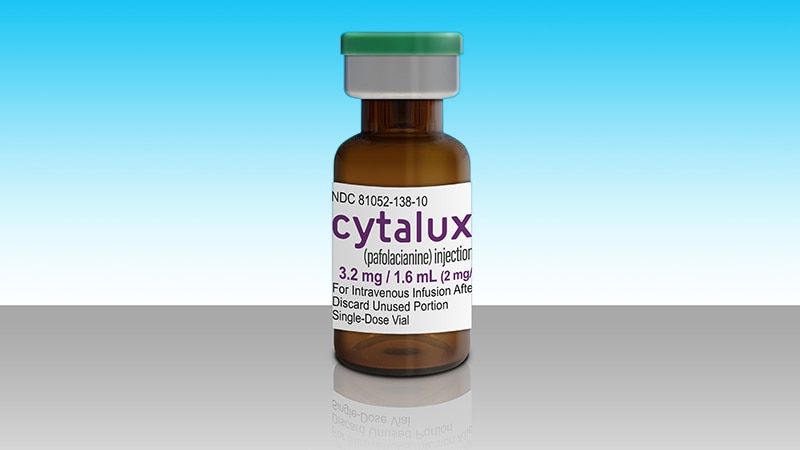The data that led to the December approval of the imaging agent pafolacianine (Cytalux), which helps surgeons identify cancerous tissue during lung cancer surgery, are now available.
The recent report, published online in the Journal of Thoracic and Cardiovascular Surgery, showed that pafolacianine led to clinically significant changes in more than half of surgeries, which included locating primary tumors and finding lesions missed on preoperative CT scans. These changes during surgery would not have happened without the use of the imaging agent.
“Our research confirmed that Cytalux helps surgeons more easily visualize lesions and detect additional cancer at one of the most critical moments — during their operation,” lead investigator Inderpal Sarkaria, MD, a University of Pittsburgh thoracic surgeon, said in a press release from On Target Laboratories, maker of pafolacianine.
However, “further investigation is needed to extend the findings to anticipated improvements in disease-free survival,” the authors note.
Pafolacianine binds to the folate receptors expressed by as many as 85% of pulmonary malignancies, causing them to fluoresce when exposed to near infrared light. The idea is to light up tumors so that surgeons can perform more thorough resections.
The US Food and Drug administration approved the agent in this past December “as an adjunct for intraoperative identification of malignant and non-malignant pulmonary lesions in” adults. Pafolacianine gained its first approval in November 2021 for ovarian cancer surgery.
The lung cancer approval was based on the ELUCIDATE trial in 112 patients undergoing thoracoscopic sublobar pulmonary resections for known or suspected lung cancer. Subjects received 0.025 mg/kg IV of pafolacianine within 24 hours of surgery. The researchers then randomly assigned 100 patients to near infrared illumination during their operations and the remainder to surgery as usual under white light.
Pafolacianine illuminated one or more clinically significant events in 53 surgical patients (53%) — specifically, the primary tumor location in 19, occult lesions missed on CT in 8, and surgical margins within 10 mm of the primary nodule in 38. Most of the occult lesions were outside of the planned surgical field.
The estimated sensitivity for detecting cancerous tissue was 76.9%; the false positive rate was 25.9%. Recurrence-free and overall survival data were not reported.
The most common adverse events in clinical studies of pafolacianine were nausea (13%), vomiting (5%), abdominal pain (2%), flushing (2%), allergic reaction (2%), blood pressure elevation (1%), indigestion (1%), and chest discomfort (1%). No serious drug-related adverse events were reported.
The authors said that pafolacianine will likely be most useful in early-stage lung cancers to identify secondary primaries and ensure adequate surgical margins. Identifying pleural metastases in patients with more advanced disease could also help avoid futile surgery.
Kristina Butler, MD, an investigator on the trial that won pafolacianine its first approval for ovarian cancer in 2021, told Medscape Medical News that, in her experience, pafolacianine does indeed help locate tumors that might be missed otherwise.
However, although the approach is “very exciting,” there’s no survival data yet to confirm the hoped-for improvement in recurrence-free survival, said Butler, a gynecologic oncologist at the Mayo Clinic in Phoenix.
Also, “the IV chemical was a bit tedious to give, required early preop administration, and the operative room equipment was a bit bulky. We do not yet use [pafolacianine] in practice,” she said.
Her group is beginning a new trial with an easily administered oral visualization agent that uses a less cumbersome head lamp for illumination. “The trial should open very soon,” Butler said.
The work was funded by On Target Laboratories. Sarkaria reported research, consulting, and/or speaking fees from the company. A second investigator is a consultant and a third is on the company’s steering committee.
M. Alexander Otto is a physician assistant with a master’s degree in medical science and a journalism degree from Newhouse. He is an award-winning medical journalist who worked for several major news outlets before joining Medscape. Alex is also an MIT Knight Science Journalism fellow. Email: [email protected]
For more from Medscape Oncology, join us on Twitter and Facebook
Source: Read Full Article
